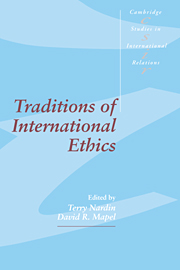Book contents
- Frontmatter
- Contents
- Contributors
- Preface
- 1 ETHICAL TRADITIONS IN INTERNATIONAL AFFAIRS
- 2 THE TRADITION OF INTERNATIONAL LAW
- 3 THE DECLARATORY TRADITION IN MODERN INTERNATIONAL LAW
- 4 CLASSICAL REALISM
- 5 TWENTIETH-CENTURY REALISM
- 6 NATURAL LAW AND INTERNATIONAL ETHICS
- 7 KANT'S GLOBAL RATIONALISM
- 8 UTILITARIANISM AND INTERNATIONAL ETHICS
- 9 THE CONTRACTARIAN TRADITION AND INTERNATIONAL ETHICS
- 10 LIBERALISM AND INTERNATIONAL REFORM
- 11 MARXISM AND INTERNATIONAL ETHICS
- 12 THE IDEA OF RIGHTS IN INTERNATIONAL ETHICS
- 13 BIBLICAL ARGUMENT IN INTERNATIONAL ETHICS
- 14 CONVERGENCE AND DIVERGENCE IN INTERNATIONAL ETHICS
- Index
- Titles in the series
9 - THE CONTRACTARIAN TRADITION AND INTERNATIONAL ETHICS
Published online by Cambridge University Press: 15 September 2009
- Frontmatter
- Contents
- Contributors
- Preface
- 1 ETHICAL TRADITIONS IN INTERNATIONAL AFFAIRS
- 2 THE TRADITION OF INTERNATIONAL LAW
- 3 THE DECLARATORY TRADITION IN MODERN INTERNATIONAL LAW
- 4 CLASSICAL REALISM
- 5 TWENTIETH-CENTURY REALISM
- 6 NATURAL LAW AND INTERNATIONAL ETHICS
- 7 KANT'S GLOBAL RATIONALISM
- 8 UTILITARIANISM AND INTERNATIONAL ETHICS
- 9 THE CONTRACTARIAN TRADITION AND INTERNATIONAL ETHICS
- 10 LIBERALISM AND INTERNATIONAL REFORM
- 11 MARXISM AND INTERNATIONAL ETHICS
- 12 THE IDEA OF RIGHTS IN INTERNATIONAL ETHICS
- 13 BIBLICAL ARGUMENT IN INTERNATIONAL ETHICS
- 14 CONVERGENCE AND DIVERGENCE IN INTERNATIONAL ETHICS
- Index
- Titles in the series
Summary
Although the contractarian tradition is relatively new compared to other traditions of ethical and political thought such as natural law, the idea of the social contract has frequently dominated modern political philosophy. In the seventeenth and eighteenth centuries, the tradition was developed and criticized by such influential thinkers as Hobbes, Locke, Rousseau, and Kant. In the nineteenth and early twentieth centuries, its influence declined in contrast with more recent traditions such as utilitarianism and Marxism. Yet contractarianism has shown great staying power, and today it is again one of the most influential traditions in political theory, largely due to the work of contemporary American philosopher John Rawls.
All contractarian arguments have a common structure, and it is this common structure that unifies the tradition. At the same time, the tradition is broad enough to permit a wide range of disagreements. The first section of this chapter presents a logical analysis that maps the common structure of contractarian arguments. With this map in hand, we will be better able to understand why the contractarian tradition has often yielded radically different conclusions across a variety of issues in international ethics.
The second and third sections of this chapter illustrate the historical range and diversity of the tradition by discussing some of the most influential classical and contemporary contractarian theorists who have written on international ethics. As we shall see, classical contractarians have been pessimistic about the possibility of international justice, whereas contemporary contractarians emphasize the possibility of international reciprocity and social cooperation.
- Type
- Chapter
- Information
- Traditions of International Ethics , pp. 180 - 200Publisher: Cambridge University PressPrint publication year: 1992
- 8
- Cited by



